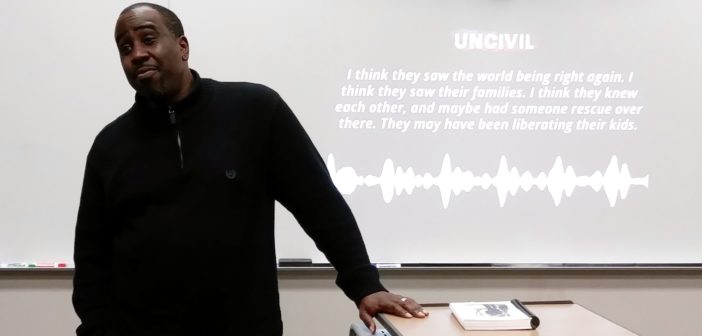Dr. Chenjerai Kumanyika of Rutgers University gave his talk “Contraband History: Podcasting a People’s Civil War” to NCC students and faculty on Nov. 1. Kumanyika, a former hip-hop recording artist and radio journalist, appeared on NPR in 2015 to talk about “Challenging the Whiteness of Public Radio.” Currently he is a scholar, journalist and artist who works as an assistant professor in the department of journalism and media studies.
Kumanyika is also the co-executive producer and co-host of Gimlet Media’s new Civil War podcast, “UnCivil,” which confronts common myths of the Civil War by introducing stories of race, class, gender and social justice.
In a recent podcast titled “Soldier,” Kumanyika disputed the idea that only men fought in the Civil War and discovered that women, in fact, did fight in the Civil War — disguised as men. However, women weren’t allowed to participate in Civil War reenactments because men argued that it would be an inaccurate representation of history, which has now been refuted by both Kumanyika, and the evidence that he provides in his podcast.
Kumanyika talked about how it is important to him to have diversity on his production team. “I want young people on my team and people of color and women,” Kumanyika said.
He further emphasizes that he wants several women on the team because it empowers them to voice their opinions without the fear of repercussions.
Throughout his talk, Kumanyika discussed several different stories that he has covered for his podcasts and elaborated on the struggles that come with those stories. For example, he spoke of a time when he was covering a tremendous scope of history for a story but needed to make it connect to now and to today’s societal issues. Because their stories cover a broad range of history, Kumanyika and his team often require help from historians to fact-check information. “We rely on the work of historians,” he said.
Another aspect of storytelling that Kumanyika struggles with is choosing a central character. When choosing primary characters, he makes sure to include the voices of people who contribute a supporting role to the story. Kumanyika also mentioned that he struggles with covering hardships. Although adversity is significant, he doesn’t want them to weaken a story’s ability to empower others.
Kumanyika relates the issue of racism during the Civil War to diverse political relationships now. “I think that to solve some of the problems we’re having now you do need multiracial coalitions,” Kumanyika said. “We’ve got to build power. It requires us to work across some of these differences.”
By sharing people’s discriminatory experiences in his podcast, Kumanyika hopes to motivate people to work together and tell the truth behind stories and to talk about history in a different and better way.

